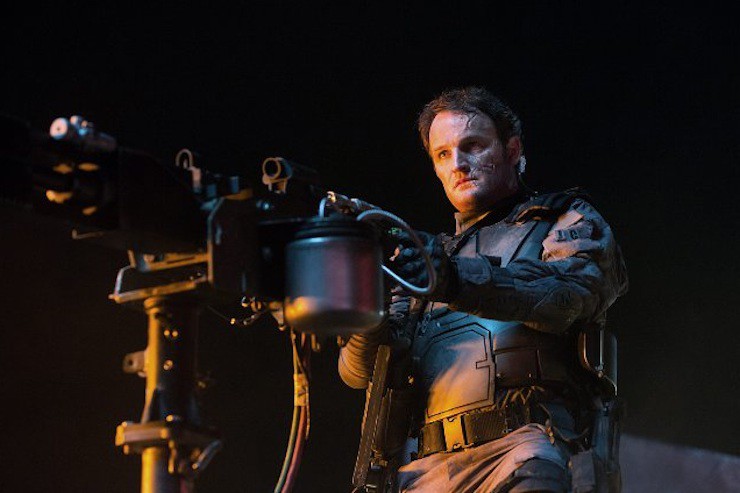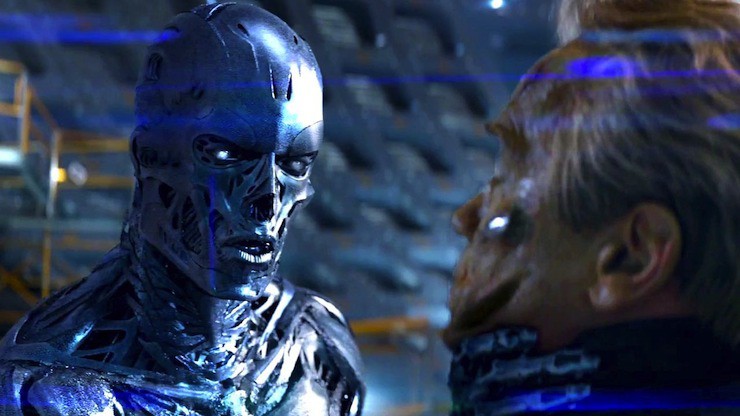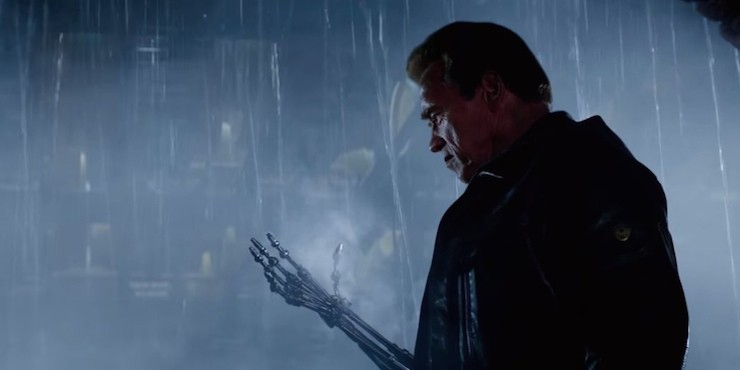Terminator: Genisys might as well be called Terminator: Wibbly Wobbly Timey Wimey. Partly because of the brief-but-important presence of Doctor Who‘s Matt Smith, but mostly because the franchise is rebooting itself with the ol’ “let’s create an alternate timeline” gambit. I’m a sucker for time travel stories that draw on and then recreate the past, so the premise seems interesting enough: In 2029, at the height of the War Against the Machines, John Connor (Jason Clarke) sends his loyal lieutenant Kyle Reese (Jai Courtney) back to 1984 to save his scared little mother Sarah Connor (Emilia Clarke) from the scary Terminators. Except that when buck-naked Kyle shows up in the past, badass Sarah and an older Terminator (Arnold Schwarzenegger, embracing his age) already know about the machines and pick Kyle up on their way to stop Judgment Day.
Some spoilers for Terminator: Genisys.
It’s definitely cool how director Alan Taylor (Game of Thrones, Thor: The Dark World) has reconstructed the 1984 of the first film, in some cases shot-for-shot. And the screenwriters up the ante, not only mimicking the first movie’s jump backwards into time, but also channeling the Terminator: Sarah Connor Chronicles‘ idea of traveling forward in time to catch up with Skynet’s newest plan to go online. In-between, we get callbacks to the original that fall just short of truly clever, and J.K. Simmons in a supporting role as a cop who believes in all this crazy future stuff but also says, “Goddamn time-traveling robots!”
It’s one of countless meta moments in the movie; the franchise is saying, We know you get frustrated, but bear with us. Unfortunately, the whole thing also gets really muddled. The Sarah Connor we knew (that is, Linda Hamilton) used to be famous for saying, “There is no fate but what we make for ourselves,” yet Terminator: Genisys seems perpetually caught between that notion (what with creating all the alternate timelines) and a crushing sense of inevitability, of having one’s future locked irreversibly into place.
Apparently Skynet decided to jump even further back into the past, to kill Sarah Connor as a nine-year old. But someone—we never find out who, which is frustrating in and of itself—sent back a reprogrammed T-800, basically cribbing the plot of Terminator 2: Judgment Day. Carrying her away from her parents’ murder, he teaches her how to fight and how to accept the future war that’s coming. Yet Sarah spends a lot of time sulking about “Pops” laying out her entire future for her. Which is ironic, considering that the other timeline’s Sarah does the exact same thing to her son John, telling him how he’ll be the Resistance leader and save everyone—how else does he know to send Kyle back into the past?
More than any other Terminator installment, this movie shows how creepy and premeditated it is for John to arrange for his own conception. His manipulation of Kyle Reese—and, if you think about that photo of Sarah he gave him, kind of conditioning—comes with the best excuse: I’m the prophet, the savior; I have to be born. But it’s still really creepy, especially when Kyle doesn’t know that in this timeline, he’s effectively more stud horse than guardian.
The movie is good for dramatizing the small payoff moments you may have wanted to see in the franchise, such as Kyle learning that his father figure John sent him back to become his literal father. And of course, you have Pops playing the overprotective dad to Sarah, while also asking her if she and Kyle Reese (said as one word that sounds more like “Kalreesi”) have “mated” yet. Parents and offspring are constantly at odds in this movie, trying to keep each other close while also pushing each other away. Even cyborg John has a tender moment with the nascent Skynet in which he tells the cluster of circuits that will eventually turn into a holographic Matt Smith, “I won’t let anyone hurt you.” (Yet, it’s Matt Smith’s cyborg who sets this timeline into existence, so huh?)
I couldn’t help but read some of these “old versus new” sequences as commentary on the franchise itself: The upstart new installment trying to shrug off its predecessors. Not surprising considering that I just rewatched Scream 4, which culminates in franchise heroine Sidney Prescott getting the snot kicked out of her by essentially her younger self, who screams at Sidney for giving her no choice in the path of her life.
Pops and Sarah’s relationship is full of contradictions: He protects her from other Terminators, but he raises her with few human guides for tackling the nuances of emotion. If anything, she’s the one teaching him how to smile nonthreateningly. (De)humanization is a theme that the franchise has been building toward over the last 30-odd years, ever since the T-800 sacrificed itself with a thumbs-up in Judgment Day and Hamilton’s Sarah mused, “If a machine can learn the value of human life, maybe we can too.”
Except that later iterations have just retread the same ground of the machines developing something akin to a conscience and sacrificing themselves. There’s a recurring bit in which Pops describes himself as “old, but not obsolete”—talking about the franchise, sure, but also his human-skin shell that actually ages with time. There’s even a brief moment, much more subtle, where you can see him examining himself and looking at Sarah, wondering how long before his body actually gives out and he can no longer protect her. You can take the Terminator out of the human, but you can’t take the human out of the Terminator.
What I’m more interested in is how the humans keep losing bits and pieces of themselves. (Or, in the case of Genisys, handing pieces over—more on that later.) In exchange for battle experience and knowledge of the future, Clarke’s Sarah trades the genuine emotions that guided her alternate self, for better or for worse. Sure, she’s not the maniacal Sarah we saw in T2, but she’s nearly robotic here. Yet what Sarah loses is nothing compared to the changes wrought in her savior son.
Reinvention is the name of the game, and nowhere do we see it more than in cyborg John Connor. Considering what we’ve already seen of him manipulating Kyle, it’s actually not that surprising—if the marketing materials haven’t already spoiled it for you—that he becomes a Terminator/human hybrid. “Survival is what you taught me,” he tells Sarah, and at points you’re hard-pressed to identify if it’s John Connor or the machine talking. It really is a shame that Jason Clarke isn’t in the movie more, because this evolution, this replacing of human emotions with magnetic filings-looking nanotech, is one of the movie’s more interesting aspects.
Speaking of bigger-picture stuff, we also finally get an answer for the head-scratching spelling of the subtitle: Genisys is a Trojan Horse app for Skynet in 2017, a Cloud stand-in that will become self-aware when we let it into our smart phones and other devices. It’s the kind of simple upgrade to the franchise that speaks volumes; there’s a brief scene where Kyle glimpses just how dependent near-future humanity is on their machines, and you’ll be just as chilled as he is. In the 1980s, we were worried about handing our weapons codes to the machines, and Skynet rightly uses that against us; upping the stakes to social media makes so much sense. Except, there’s a throwaway line about how we’re still letting Genisys run our weapons systems in addition to our Instagram photos—how does this make any sense?
As Mad Max: Fury Road showed us, it’s not impossible to retroactively insert alternate timelines (or, in that case, entire in-between-movie adventures) into a preexisting franchise. But you have to say and show something new. This movie just feels like the most literal definition of a reboot: At one point, Kyle quips to his father-in-law figure Pops, “There is a switch, and I will find it.” The franchise has already found that switch, turning the machine on and off again to try and see if the screen spits out something new.
The whole point of Terminator: Genisys is supposed to be about alternate timelines in which humanity can actually wrest back control. But there’s a mid-credits scene that essentially undoes that whole idea. Not surprising, since Genisys has been floated as the start of a new trilogy. But where even lackluster, quasi-canon sequel Terminator: Rise of the Machines managed to shock audiences with its reveal that Judgment Day is inevitable no matter what, here that same prospect is just exhausting.
Natalie Zutter actually laughed out loud when Pops brought back the thumbs-up. You can read more of her work on Twitter and elsewhere.

















The problem is that this series was created as an embodiment of 80s nuclear holocaust fears. The fatalism of the first one perfectly captured the mood of this country during the early years of Reagan’s fear-mongering (I remember having conversations on the playground in middle school about whether we would go instantly or die from fallout). The upbeat message of the second one was a reaction to the fall of the Soviet Union and the Berlin Wall.
These are simply not relevant to this day and age. Today’s generation has its own dystopias. If this series is ever going to be relevant again, it must adapt accordingly.
@1/Walker: I think The Sarah Connor Chronicles did a good job making it relevant to today’s concerns by making it more about the Singularity than about nuclear war. But then, as a weekly series, it was able to explore its AI characters in much more depth than a movie can. Really, it pretty much goes without saying that no modern action movie would ever have a chance of being remotely as smart, sophisticated, and deep as TSCC was.
Meanwhile, modern AI is borderline creepy, with moments of “huh?”
The problem with a lot of sci-fi franchises as they age is the failure to accept they have become period pieces. There is nothing wrong with something that was futuristic moving into the past. Father time is undefeated and sci-fi defines new genres all the time.
What doesn’t work is an unwillingness to re-frame the story.
@4/Dean Hacker: Isn’t reframing the story exactly what things like this are trying to do? For instance, it’s no longer about the fear of military computers controlling nuclear weapons, but about the fear of social media and cloud apps controlling our lives.
@1
Thats not what Cameron hinself has said. Where do you get the Reagan fear from?
https://www.youtube.com/watch?v=jAcrgwOShF0
@6
Regardless of what Cameron claims, the first movie is very 1984. That year was the height of Cold War fears (post 60s, that is) because of Reagan’s rhetoric with the USSR. Fears of nuclear war permeated pop culture everywhere at that time.
@6 and @7
The story is about an eventual nuclear war. The terminator character is easy to see as a stereotypical (dehumanized) communist from the 80s. That said, many of us were alive for the cold war. If you’re looking back at your days on the schoolyard, remembering Reagan as being a fear monger, I think you’re really projecting some more recent politics onto the past. Reagan was a hawkish bully, but he was also very optimistic. Early in his presidency he started talking about the imminent collapse of the Soviet Union, and acted as if the Soviets had no real power. This was incredibly dangerous and provocative, but the opposite of fear mongering.
In some ways, the Genisys McGuffin is a return to an ancestor of the Terminator franchise, 1966’s Cyborg 2087. There, the threat in the future is a network that can control the brains of the entire human race by radio. Cold War scary communism, but not involving nuclear war.
@8/boquaz: I have to disagree. There’s nothing recent about it. When I was in high school in the early ’80s, we had to do what were essentially duck-and-cover drills, and I think my sister got in trouble for pointing out how utterly futile they would be (or was that me?). The everyday fear of nuclear annihilation was very much with us all. If you look at Carl Sagan’s Cosmos, the episode where he talked about the Drake Equation as a tool for talking about the parameters that go into assessing the likelihood of contacting alien civilizations, his most optimistic assessment of civilizations’ longevity was that one percent of them might survive their nuclear eras. That’s the way the future looked to us back then. I don’t know if I’d say that Reagan was personally trying to make us afraid, but his hawkish stance and the tensions it raised certainly made nuclear war seem more likely, and that scared us whether he meant it to or not.
I decided to wait and see and your advice to ‘skip’ this Terminator is a good one, so far I’ve heard only very poor things about it, and like most movies I’ll just wait until Netflix gets it! A savings of about ten dollars!
Thanks for the Heads Up!
There are an awful lot of bombs out there, and an awful lot of idiots in government (or their accomplices) who think using them would be a fine thing. I think it’s a bit early to count thermonuclear holocaust out.
I’ll just point out that nothing that happened in this movie contradicts my post from last year:
http://www.tor.com/2014/03/07/but-that-contradicts-the-entire-premise-of-the-terminator/#comment-422347
If you think about it, regardless of anything else that happens, every single movie gives us an upgraded Skynet.
I liked a lot of what they were trying to do in this movie, but think they didn’t really nail the execution. Emilia Clarke did a pretty good job of being a new Sarah Conner, but I never quite bought Jai Courtney as Kyle Reese — I think he was too physically dissimilar or something. I’m prepared to accept that’s a problem with me, though — his performance was fine.
I also miss the days of T2 when they did helicopter stunts by flying in a real helicopter.
I agree that a missed opportunity in this movie was that it didn’t sufficiently update the story by exploring the way we interact with our devices now. The throwaway line about Genisys also controlling nukes means that Judgment Day would still be the same, as opposed to a new take on it — one where Skynet perhaps takes us over as individuals rather than wiping us out. What if Skynet treated everyone’s brain as a server to live in, or something? Could have been an interesting new take.
Ultimately, judged solely by the criteria of “did the movie keep me entertained for its running time,” for me, the answer was yes. Did it add anything great to the franchise? No, but not even the pretty good Sarah Connor Chronicles could match the excellence of the first two films. If they do make the sequels they’re planning, hopefully they allow themselves some more time to explore new ideas. I’d see them, but partly because at this point I’ve made a tradition about blogging about Terminator movies. (Most recently here, for anyone who wants a more in-depth discussion than I get into in this comment: http://holstory.blogspot.com/2015/07/he-was-right-about-how-hed-be-back.html. I end up agreeing with a few of Ms. Zutter’s points.)
–Andy